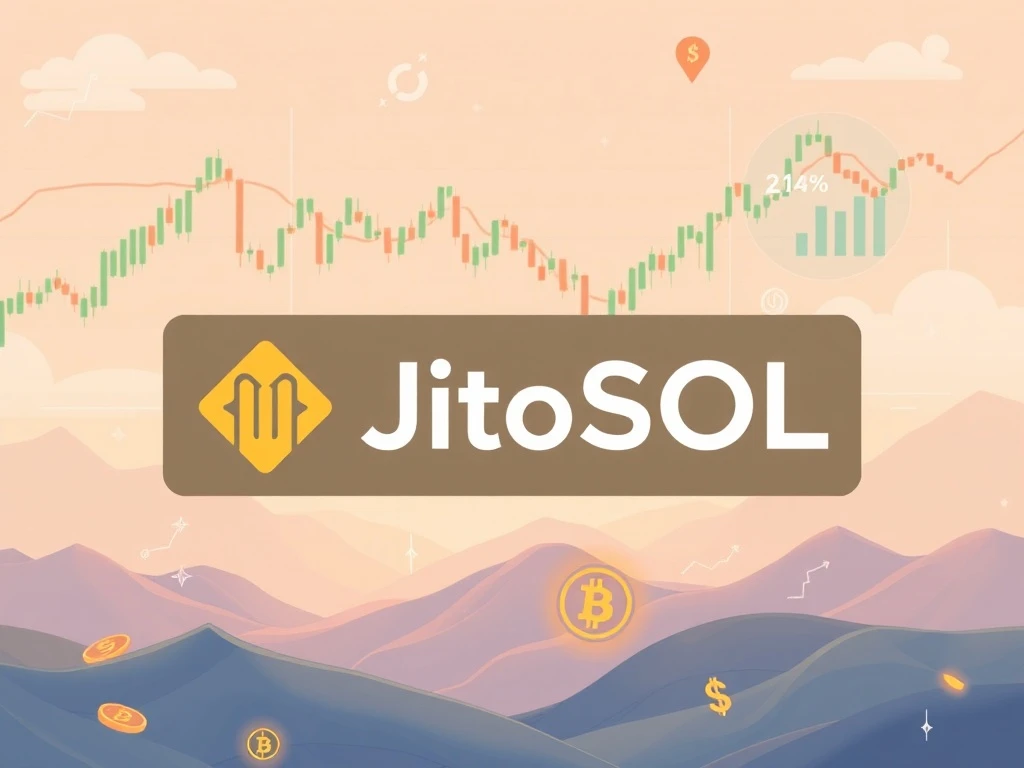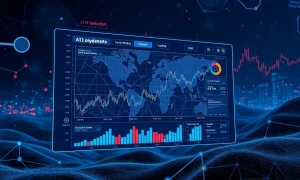For forward-thinking investors and entrepreneurs, understanding the evolving landscape of cryptocurrency investment is crucial. A significant development recently emerged as global asset manager VanEck filed for the first-ever US **JitoSOL ETF**. This bold move aims to provide regulated access to Solana‘s staking rewards, marking a potential paradigm shift in digital asset investment products. This filing not only expands VanEck’s digital asset offerings but also directly challenges the US Securities and Exchange Commission (SEC) on its evolving stance regarding liquid staking tokens.
Understanding the JitoSOL ETF and Liquid Staking
VanEck officially submitted an S-1 registration statement to the US Securities and Exchange Commission (SEC). This filing proposes the creation of the VanEck **JitoSOL ETF**. This groundbreaking fund will exclusively hold **JitoSOL**, a liquid staking token issued by Jito Network. Importantly, this marks the first attempt to register a US exchange-traded fund backed by a liquid staking token.
But what exactly is **JitoSOL**? It represents Solana (SOL) that has been locked with validators. This process, known as liquid staking, allows investors to earn rewards. Crucially, **JitoSOL** provides a transferable token that accrues these staking rewards. Therefore, investors can maintain liquidity while participating in the staking process. This innovative product could potentially expose a wider range of investors to Solana’s staking yields through a regulated investment vehicle.
VanEck has been a pioneer in the digital asset space. The firm launched its spot Bitcoin ETF earlier in 2024. Following this, it also introduced an Ether ETF. However, the proposed **JitoSOL ETF** presents a unique challenge. Unlike its previous offerings, this fund will directly test the SEC’s specific position on staking, particularly liquid staking mechanisms.
The SEC’s Evolving Stance on Staking
The filing by VanEck arrives amidst ongoing discussions and debates surrounding staking. Jito Labs and the Jito Foundation, for instance, co-authored a letter to the SEC on July 31. This letter urged regulators to permit liquid staking tokens, like **JitoSOL**, within exchange-traded products (ETPs). Prominent industry players, including VanEck, Bitwise, Multicoin Capital, and the Solana Policy Institute, supported this initiative.
These groups argued that liquid staking tokens offer a safer and more efficient method for integrating staking into ETPs. They highlighted several key benefits:
- **Distributed Stake:** Liquid staking spreads the stake across multiple validators.
- **Reduced Complexity:** It significantly lowers operational complexity for fund managers.
- **Enhanced Safety:** It provides a more secure way to engage in staking.
Furthermore, they referenced existing SEC guidance. This guidance indicates that most forms of staking do not qualify as securities transactions. They framed liquid staking tokens as consistent with these established rules.
The SEC’s guidance has evolved over time, offering clarity in two main parts:
- **May Statement:** The SEC’s staff stated that solo and delegated staking generally fall outside securities laws. This is because protocol, not a third party, sets the rewards.
- **August Extension:** The agency extended this view to liquid staking. It described receipt tokens, such as **JitoSOL**, as evidence of ownership. These are not investment contracts, provided the provider does not exert discretionary control.
It is important to note, however, that these are staff statements. They do not constitute binding rules. Consequently, the Commission or courts could reinterpret them. This inherent ambiguity creates a complex regulatory environment for products like the **JitoSOL ETF**.
Past Regulatory Actions and ETF Approvals
The SEC’s posture on staking has shifted considerably from its past actions. In February 2023, for example, the agency charged crypto exchange Kraken. Kraken offered an unregistered staking program. This resulted in a significant $30 million settlement. Furthermore, it led to the closure of Kraken’s US staking service. Later that same year, the agency sued Coinbase over similar allegations. However, that specific case was dismissed in February 2025.
Beyond enforcement actions, the SEC has also influenced staking policy through the ETF approval process. When the agency approved spot Ether ETFs in May 2024, issuers initially proposed including the option to stake Ether (ETH) held by the funds. Nevertheless, the SEC required all references to staking to be removed. This was a prerequisite for approving the US spot Ether ETFs.
As a direct result, the Ether ETFs launched last year by prominent issuers, including BlackRock, Fidelity, Grayscale, and VanEck, hold only ETH. They do not engage in staking activities. This precedent sets a challenging environment for the proposed **JitoSOL ETF**, which explicitly seeks to offer staking rewards.

US spot Ether ETFs. Source: TradingView
Implications for Investors and the Solana Ecosystem
The potential approval of a **JitoSOL ETF** carries significant implications for various stakeholders. For retail and institutional investors, it would represent a regulated gateway to the Solana ecosystem’s staking yields. Currently, participating in liquid staking often requires direct engagement with decentralized protocols, which can involve technical complexity and perceived regulatory risk. A regulated ETF would streamline this process, potentially attracting a new wave of capital into the liquid staking sector.
Furthermore, the **JitoSOL ETF** could enhance the overall market legitimacy of liquid staking tokens. Regulatory approval often acts as a stamp of credibility. This could foster greater trust and adoption among traditional financial institutions. For the Solana network, increased investment through such an ETF could bolster its security and decentralization. More SOL being staked means more network participation. This strengthens the protocol’s underlying infrastructure.
However, potential challenges remain. The SEC’s cautious approach to staking indicates a need for clear legal frameworks. The distinction between a security and a non-security, especially for yield-bearing assets, continues to be a point of contention. Should the **JitoSOL ETF** gain approval, it would set a powerful precedent. It could pave the way for other liquid staking token ETFs across various blockchain networks. This would signify a maturing of the crypto investment landscape.
Future Outlook for the JitoSOL ETF and Crypto Regulation
The filing for the **JitoSOL ETF** underscores a critical juncture in cryptocurrency regulation. It highlights the industry’s push for regulated products that offer more than just spot exposure to digital assets. As the crypto market matures, investors increasingly seek sophisticated investment vehicles. These vehicles should combine the benefits of blockchain technology with the safety and oversight of traditional finance.
The outcome of VanEck’s application will be closely watched. An approval could signal a more accommodating regulatory environment for yield-generating crypto assets. Conversely, a rejection would reinforce the SEC’s conservative stance. It would also underscore the challenges in bringing innovative crypto products to the mainstream. Regardless of the immediate outcome, this development initiates important dialogues. It forces regulators to further define the boundaries of digital asset securities. This ongoing engagement between innovators and regulators is essential. It shapes the future of cryptocurrency adoption and integration into the global financial system.
Ultimately, the journey of the **JitoSOL ETF** will be a litmus test. It will assess the readiness of US regulators to embrace the complexities and opportunities presented by decentralized finance and staking mechanisms. The decision will impact not only Solana and Jito Network but also the broader trajectory of crypto investment products.
Frequently Asked Questions (FAQs)
What is the VanEck JitoSOL ETF?
The VanEck **JitoSOL ETF** is a proposed exchange-traded fund that would hold JitoSOL, a liquid staking token for Solana. It aims to provide investors with regulated exposure to Solana’s staking rewards without directly managing the staking process.
How does JitoSOL liquid staking work?
JitoSOL represents Solana (SOL) tokens that are staked with validators on the Solana network. In return, holders receive JitoSOL tokens, which are transferable and accrue staking rewards. This allows users to earn staking yield while maintaining liquidity.
Why is the JitoSOL ETF significant for investors?
This ETF is significant because it would be the first US-regulated product offering exposure to liquid staking rewards. It could simplify access to crypto staking for traditional investors, reducing technical barriers and perceived regulatory risks associated with direct participation.
What is the SEC’s current stance on staking and liquid staking?
The SEC’s staff has issued guidance suggesting that solo and delegated staking, and potentially liquid staking receipt tokens like JitoSOL, generally fall outside securities laws if rewards are protocol-determined and providers lack discretionary control. However, these are staff statements, not binding rules, and the SEC has previously taken enforcement actions against certain staking programs.
How does this differ from the approved spot Ether ETFs?
Unlike the proposed **JitoSOL ETF**, the approved spot Ether ETFs from issuers like VanEck and BlackRock were required to remove all references to staking. They only hold spot ETH and do not engage in staking activities, highlighting the SEC’s differing approach to yield-generating crypto products.
What could be the impact of a JitoSOL ETF approval on the crypto market?
An approval could set a significant precedent for other liquid staking token ETFs, potentially opening up new regulated investment avenues for various blockchain assets. It could also enhance the legitimacy of liquid staking and attract more institutional capital into the decentralized finance (DeFi) sector, particularly within the Solana ecosystem.


















